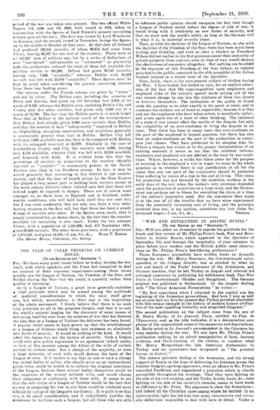Tim NEED OF CLEAR THINKING ON CURRENT
ISSUES.
[TO THE EDITOR OF TEE" SPECTATOR.") r35,—We have many great issues before us to-day, besides the war itself, with which speakers and the Press feel compelled to deal an account of their supreme importance—among these issues notably are the League of Nations, the Freedom of the Seas, and Etrikes during the War—but the result is quantity rather than quality of reasoning.
As to a League of Nations, a great issue generally embodies a vital principle which may be missed among the multitude of material considerations to which the issue itself gives rise, but which, nevertheless, is there and is the inspiration *f the whole movement. I firmly believe that there is no such vital principle at all in the proposed League, and that it is only the world's natural longing for the discovery of some means of delivering itself for ever from the miseries of war that has fostered the idea that in a League of Nations the deliverer has been found. A popular belief seems to have grown up that the establishment at a League of Nations would bring into existence an absolutely new factor of security. It would do nothing of the kind. It would affect the degree but not the factors of security. Such a League could only give public expression to an agreement (which exists, in fact, at this moment among the Allies) of the wills of certain nations to certain ends. But a change of the majority, or even a large minority, of such wills Would destroy the basis of the League at once. It is useless to say that in case of such a change the united bodies of police, who should serve as an international police force, could be looked to to enforce the original intentions sf the League, because those several bodies themselves would be the creatures of the several national wills, and would change their allegiance in conformity with those wills. It seems to me that the sole virtue of a League of Nations would be the fact that secrecy in preparing for war many form would be rendered more fliffieull.hy,virtne of the League's machinery. It is quite true that this.is. no small consideration, and it undoubtedly justifies the endeavour to institute such a League, 'tut all those who are able to influence public opinion should recognize the fact that though a League of Nations would reduce the degree of risk of war, it would bring with it absolutely no new factor of security, and that we must seek the world's safety, as long as the German will is what it is, in material security alone.
Then, as with the doctrine of the League of Nations, so also with the doctrine of the Freedom of the Seas, there has been much loose writing and thinking, and even so clear a thinker as President Wilson did not realize in his first pronouncement that immunity of private property from capture, even in time of war, would destroy the effectiveness of sea-power altogether. But nothing can be added to the exposure of this Freedom, of the Seas fallacy, as vaguely preached to the public, conveyed in the able pamphlet of Sir Julian Corbett noticed in a recent issue of the Spectator.
Then, lastly, there is the ever-present subject of Strikes during the War. I have looked, but looked in vain, for an explicit admis- sion of the fact that .11% superimposition upon employers and employed alike of the nation's special needs arising out of the war cannot change by one iota the relations of these two classes as between themselves. The inclination of the public to brush aside the question as to what exactly is the point at issue, and to condemn the strikers out of hand as unpatriotic, because it is they and not the employers who have taken action, is manifestly unfair, and arises again out of a want of clear thinking. The existence of a state of war cannot affect the merits of the dispute, but only. the culpability of an over-readiness to bring the dispute to an issue. That there has been in many cases this over-readiness on the part of the employed is beyond question, but there has also been an under-readiness on the part of the authorities to antici- pate just claims. They have preferred to let sleeping dogs lie. Where a dispute has arisen as to the proper interpretation of an existing contract it seems to me that the relations between employers and employed are not affected in the least by war condi- tions. Where, however, a strike has taken place fox the purpose of securing to the employed a rise in wages we come to the whole question as to whether there is any justification at all for the claim that any one part of the community should be protected from suffering by reason of a rise in the cost of living. This claim for protection was put forward by the munition workers in the early days of the war when the nation's very existence depended upon the production of munitions on a large scale, and the Govern- ment was perhaps not to blame for conceding the claim at a time of the nation's imperative need. But the concession then made is at the root of all the trouble that we have since experienced from the constantly increasing cost of hying, and the principle involved does not, in my opinion, constitute any just claim for Increased wages.—I Rill, Sir, &c., THINKER.


































 Previous page
Previous page